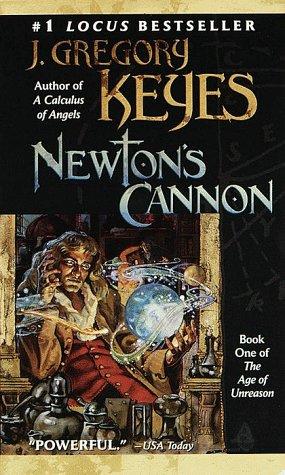Serg reviewed Newton's Cannon by J. Gregory Keyes
Clockpunk with a touch of horror... and a few famous people too many.
3 stars
An interesting alternate history based on the premise that Isaac Newton's experiments in alchemy had borne as much fruit as his investigation of physics.
The book roughly consists of two parallel stories: that of Benjamin Franklin in the New World and England, and of a woman named Adrienne in France. Their stories are told in alternating chapters.
Newton's discoveries have opened the door to a whole slew of new inventions, most important of which is called an "aetherscreiber". The basic idea is that two attuned crystals can copy each other's vibrations even if they are literally on the other side of the world - making one-on-one communication possible worldwide. However, they only work in pairs: each screiber can only be attuned to one other, so mass media is not yet possible.
Nonetheless, it is through these ingenuous alchemical devices that the two storylines are linked together, as people in both …
An interesting alternate history based on the premise that Isaac Newton's experiments in alchemy had borne as much fruit as his investigation of physics.
The book roughly consists of two parallel stories: that of Benjamin Franklin in the New World and England, and of a woman named Adrienne in France. Their stories are told in alternating chapters.
Newton's discoveries have opened the door to a whole slew of new inventions, most important of which is called an "aetherscreiber". The basic idea is that two attuned crystals can copy each other's vibrations even if they are literally on the other side of the world - making one-on-one communication possible worldwide. However, they only work in pairs: each screiber can only be attuned to one other, so mass media is not yet possible.
Nonetheless, it is through these ingenuous alchemical devices that the two storylines are linked together, as people in both storylines exchange secretive communications.
But Newton's alchemy can also be used for destruction - Louis XIV, the Sun King, seeks to have it used to develop a weapon in his war against England.
Worse yet, there are other creatures than humans around, and the alchemical process that makes aetherschreibers possible also brings humanity in contact with them. We learn only a little of these mysterious beings, but enough to realize that they do not look kindly upon humankind...
Keyes understands how to end each chapter on a cliffhanger. Perhaps he understands it a little too well, because it feels disappointing to be given a cliffhanger and then have the next chapter continue the other storyline. Still, it is enough to make one keep reading.
My main complaint about the book is that it has a few too many famous people. A meeting between the young Benjamin Franklin and Blackbeard strains its credibility. Similarly, an important side character turns out to be the grandson of d'Artagnan - one can taste how dearly Keyes would have liked to have the historical d'Artagnan in the story. Since the real d'Artagnan had long died before the book starts, Keyes settles for his grandson.
That said, it is a good adventure story with good worldbuilding. Rather than simply having a 1700's world with magic, Keyes has created an alternative 1700's where the new inventions are firmly rooted in alternative science. He even goes so far as to explain how several of these devices work, showing he's given serious thought to the workings of Newton's alchemical science.
It is clearly the start of a series; the opening salvo of a much longer battle. When the book ends, the world is aflame. And the book's epilogue is another cliffhanger.
All in all I found it a good read. Recommended for the lovers of clockpunk, fantastical alternate histories, and adventure stories in general.

